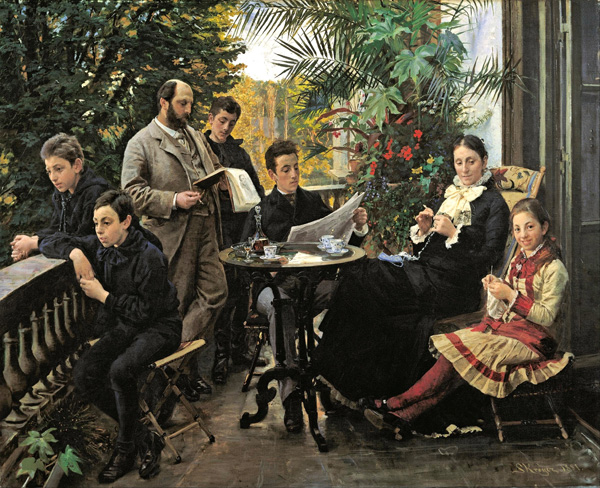
For what seems to be about the past two years one of the memes making the rounds of the internet (or at least of its corners that I frequent) is that of "How people ignored each other before smartphones". In January of 2015 there seems to have been an explosion of tweets and retweets on the topic, but I've found that it shows up at least a few times almost a year earlier. A few different images have been associated with the meme, but the late 19th century portrait of the Hirschsprung family by Peder Severin Krøyer is by far the most popular. Basically, what we're supposed to learn from the painting is that people were quite adept at not paying attention to one another well before they had smartphones in their hands.
Clearly, the members of this wealthy family weren't "communicating" with each other - at least not while their portrait was being painted. Whether or not they're actively "ignoring" each other is quite a different question. Maybe they're giving each other some personal space, and certainly there's nothing wrong with that. Maybe only a few moments before they moved to the veranda for the painting of this scene they finished a family meal, with lots of interesting discussion around the table, and now they're more than happy to allow each his or her own thoughts.

Reading books chronically understimulates the senses. Unlike the longstanding tradition of gameplaying-which engages the child in a vivid, three-dimensional world filled with moving images and musical soundscapes, navigated and controlled with complex muscular movements-books are simply a barren string of words on the page. Only a small portion of the brain devoted to processing written language is activated during reading, while games engage the full range of the sensory and motor cortices.In other words, chances are good that books would be regarded as something that limits interaction with other people. Something similar was alluded to over 200 years ago by critics of book reading, though not exactly the power of books to isolate or atomize. James Van Horn Melton, in The Rise of the Public in Enlightenment Europe (p. 110 - 111), writes:
Books are also tragically isolating. While games have for many years engaged the young in complex social relationships with their peers, building and exploring worlds together, books force the child to sequester him or herself in a quiet space, shut off from interaction with other children. These new "libraries" that have arisen in recent years to facilitate reading activities are a frightening sight: dozens of young children, normally so vivacious and socially interactive, sitting alone in cubicles, reading silently, oblivious to their peers.
Critics feared that middle-class women had become so addicted to novel-reading that many ignored their domestic duties. In 1785 the Silesian author cited above warned of dire domestic consequences "if a woman devotes all her tme to reading ... and neglects her obligations as wife, mother, and household manager.It may be true that our love of the smartphone causes us to reduce the amount of time we spend with the people with whom we're in physical proximity, but that doesn't necessarily mean that we communicate less. Some critics tell us that we're less capable of empathizing via a screen than via face to face. That may be true. Then again, when we didn't receive photographs via our television screens (and today on our phones) of disasters on the other side of the world we didn't know they'd occurred so we had no reason to feel toward those unknown others, either positively or negatively. We didn't need smartphones in order to ignore others, and to my mind the jury is still out on whether they actually reduce our ability to empathize.